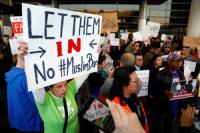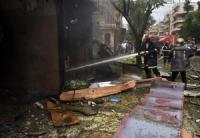-
Former Israeli counterterror chief: War with Hezbollah is “only a question of time”
The Lebanese terrorist group Hezbollah is attempting to acquire game-changing weapons in anticipation of launching another war against Israel, a former Israeli security chief told reporters on Monday. Referring to the two earlier rounds of war between Israel and Hezbollah – in 1996 and 2006 — Brig. Gen. (res.) Nitzan Nuriel said: “The third war between Israel and Hezbollah is only a question of time,” he observed, “but it’s not connected to what’s going in Syria today.”
-
-
Basque separatist group ETA to disarm

On Friday, the militant separatist group ETA has announced that, by early next month, it will completely disarm, and that from that point forward it will pursue its goal of an independent or autonomous Basque region by political means. Friday’s announcement comes six years after ETA renounced the use of violence. ETA was formed in 1959, and, in 1968, launched a campaign of violence against the Spanish state. ETA’s terror campaign, which ended in 2011, killed 829 Spanish politicians, policeman, military personnel, judges – but also a number of innocent bystanders – in bombings and shootings.
-
-
In first, Israel’s Arrow-3 system intercepts Syrian missile fired at Israeli jet
Israel’s Arrow-3 system successfully intercepted a Syrian anti-aircraft missile that was shot at Israeli jets conducting a mission in Syria on Thursday night, the Israel Defense Forces said in a statement. It is the first time that the Arrow-3 system is known to have been used operationally.
-
-
Two government reports do not strengthen case for travel ban
Two internal government reports appear to weaken the case the Trump administration has been making for the temporary travel ban. The implementation of the second version of the ban has been halted by judges in Hawaii and Maryland. The first report, prepared by DHS, found that most of the suspected or confirmed foreign-born terrorists probably became radicalized after they arrived in the United States, not before. The second report, based on data collected by the FBI, shows that most of the suspected or confirmed foreign-born terrorists had come from countries not among the six countries to which the travel ban would apply. The data in the two reports “points to the central question about the travel ban, which is, are you addressing the issues you need to address when it comes to the threat?” says one expert.
-
-
Immigration bans tend to create unintended consequences

Research of various measures to restrict immigration — a policy response common for countries that have experienced terrorist attacks in the past — has pointed to unintended long-term consequences of similar controls on immigration. “Some recent research shows that umbrella restrictions on migration control can backfire,” says one researcher. “Instead of mitigating radicalization, these restrictions tend to have blowback effects. Insofar as the ban against a set of states is an umbrella ban, it’s likely to have the same unintended negative effects.”
-
-
Targeting of Syrian healthcare as “weapon of war” sets dangerous precedent: Experts

The strategy of using people’s need for healthcare against them by violently denying access sets a dangerous precedent that the global health community must urgently address, researchers say. As new estimates of death toll for health workers are published, experts say the deliberate and systematic attacks on the healthcare infrastructure in Syria – primarily by government forces – expose shortcomings in international responses to health needs in conflict.
-
-
How online hate infiltrates social media and politics
In late February, the headline of a news commentary website that receives more than 2.8 million monthly visitors announced, “Jews Destroy Another One of Their Own Graveyards to Blame Trump.” With only a headline, this site can achieve something no hate group could have accomplished twenty years ago: It can connect with a massive audience. Looking at the most-visited websites of what were once diminished movements – white supremacists, xenophobic militants, and Holocaust deniers, to name a few – reveals a much-revitalized online culture. To whom, and how many, this latest conspiracy may travel is, in part, the story of “fake news,” the phenomenon in which biased propaganda is disseminated as if it were objective journalism in an attempt to corrupt public opinion. Today’s radical right is also remaking its profile, swapping swastikas and white-power rock for political blogs and news forums. The trappings may have changed, but the bigotry remains. Hate rhetoric repackaged as politics and housed in websites that look just like any other online blog can attract, or even persuade, more moderate ideologues to wade into extremist waters. This “user-friendly” hate community is joining forces in a way that could never happen in the offline world. Thanks in part to this connectedness, these poisoned narratives are now spreading well beyond racist websites.
-
-
Syria’s government exploits UN aid system, starving civilians

Over the past year, Syria’s government has consistently exploited the United Nations aid delivery system, deliberately and illegally depriving millions of Syrians of critically needed humanitarian aid. In a new report, Access Denied, Physicians for Human Rights (PHR) said that Syrian authorities, by continuing to exert unilateral control over aid deliveries throughout 2016, effectively guaranteed the sustained suffering of civilians in besieged and hard-to-reach areas across the country.
-
-
Countering terrorism: No simple solutions
“Our bureaucratic and organizational structures are ill-adapted to a threat that is changing rapidly, constantly and in many different ways,” terrorism expert Martha Crenshaw said. She and START director Dr. Gary LaFree are the authors of a new book, Countering Terrorism: No Simple Solutions. Rather than pronounce lofty but vague goals in the fight against terrorism, Crenshaw suggested a focus on creating incremental, short-term policy efforts that might allow for more specific, attainable goals.
-
-
Is the Muslim Brotherhood a terrorist organization?
The Trump administration as well as Republican lawmakers are seeking to introduce legislation that would designate the Muslim Brotherhood a Foreign Terrorist Organization (FTO). Many are questioning this move. The fact is that the Muslim Brotherhood has not been directly involved in any violent terror attacks in recent decades. Indeed, designating the Muslim Brotherhood as a Foreign Terrorist Organization could have the effect of limiting the opportunities for those Muslims who are attracted by the Muslim Brotherhood’s moderate agenda to engage in politics. It could even accelerate recruitment to terrorist outfits – a possibility that the Trump administration might seek to take into account.
-
-
Experts: U.S. should designate Iran’s Revolutionary Guards as a terrorist organization

The United States should officially designate Iran’s Islamic Revolutionary Guard Corps (IRGC) as a terrorist organization, two experts argue. The two point out that “since its foundation, the IRGC has overseen a terror apparatus that has assassinated intellectuals, journalists, dissident politicians, and literary figures.”
-
-
White supremacists dramatically increase recruitment efforts on U.S. college campuses

White supremacists, emboldened by the 2016 elections and the current political climate, are currently engaged in an unprecedented outreach effort to attract and recruit students on American college campuses. The Anti-Defamation League (ADL) has cataloged 107 incidents of white supremacist fliering on college campuses since the school year began in September 2016, with surge of activity since January 2017, when 63 of the total incidents (61 percent) occurred.
-
-
Predicting terrorist behaviors with more than 90 percent accuracy
Government agencies cannot always use social media and telecommunication to uncover the intentions of terrorists as terrorists are now more careful in utilizing these technologies for planning and preparing for attacks. A new framework is able to understand future terrorist behaviors by recognizing patterns in past attacks. The researchers used data on more than 150,000 terrorist attacks between 1970 and 2015 to develop a framework that calculates the relationships among terrorist attacks (for example, attack time, weapon type) and detects terrorist behaviors with these connections.
-
-
Why Muslim states’ support of U.S. global War on Terror has been lukewarm
If President Donald Trump’s administration plans to pressure Muslim states into supporting the U.S. Global War on Terror, they would be wise to consider the findings in a new book showing historically weaker counterterrorism support from countries where the religion-state balance leans toward the former. A new book reveals why support for the U.S. Global War on Terror from Muslim states has ranged from full cooperation, to minimal support, to somewhere in between.
-
-
Revised ban excludes Iraq, current visa holders; no priority to religious minorities
President Donald Trump has signed a revised travel ban which will go into effect on 16 March. The revised executive order will halt entry to the United States for ninety days for people from six Muslim-majority nations who are seeking new visas. Iraq has been removed from the list of travel ban countries, and Syrian refugees will now be treated as other refugees. Religious minorities will not be given preferential treatment.
-
More headlines
The long view
How Male Grievance Fuels Radicalization and Extremist Violence
Social extremism is evolving in reach and form. While traditional racial supremacy ideologies remain, contemporary movements are now often fueled by something more personal and emotionally resonant: male grievance.
